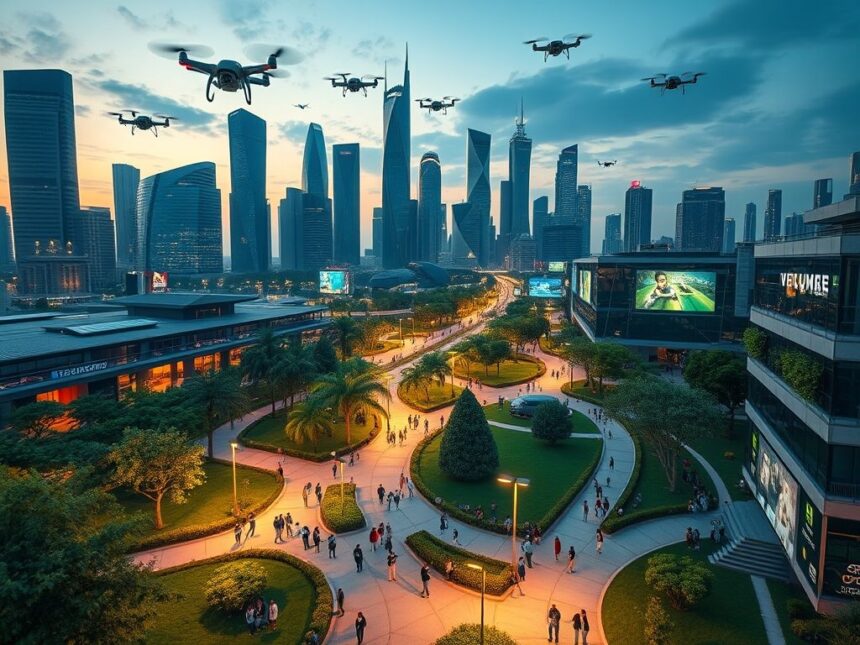Transforming Urban Landscapes with AI-Driven Innovations
Key Highlights:
- Government integrates AI into urban planning under the Smart Cities Mission.
- ₹3,500 crore investment allocated for AI-powered urban infrastructure development.
- Focus areas include traffic management, waste optimization, disaster response, and smart utilities.
- Deployment of AI tools across 100+ cities by 2030.
- Collaboration with private tech firms and academic institutions to drive innovation.
The Story
In a significant stride toward sustainable urban development, the government has unveiled plans to integrate Artificial Intelligence (AI) into urban planning and the Smart Cities Mission. With an investment of ₹3,500 crore, this initiative seeks to address the growing challenges of urbanization by creating efficient, technology-driven cities designed to improve quality of life.
Union Minister Hardeep Singh Puri emphasized the transformative potential of AI in his address, stating, “Smart cities powered by AI are not just futuristic concepts; they are essential solutions to modern urban challenges. This initiative aims to make our cities safer, greener, and more livable for all citizens.”
By leveraging AI, the government plans to reimagine urban planning, making cities more adaptive to the needs of their residents while tackling issues like congestion, waste management, and environmental sustainability.
Strategic Focus Areas for AI Integration
The initiative outlines several critical areas where AI will play a pivotal role:
- Smart Traffic Management: AI-powered systems to optimize traffic flow, reduce congestion, and predict peak-hour trends.
- Waste Management: Tools for efficient waste collection and recycling, minimizing landfill usage.
- Disaster Response Systems: Real-time AI models to predict natural disasters and coordinate emergency responses.
- Energy Optimization: AI-driven smart grids to monitor energy consumption and reduce wastage.
- Urban Planning Models: Predictive analytics for zoning, housing demand, and public transportation needs.
Key Projects and Collaborations
The government has partnered with leading technology firms and research institutions to drive urban innovation. Some notable projects include:
- Traffic Flow Optimization in Bengaluru: An AI-driven project reduced average commute times by 20% within six months of implementation.
- Smart Waste Management in Indore: AI-based tools improved waste segregation efficiency, making Indore a model city for sustainability.
- Flood Prediction in Chennai: An AI system accurately predicted monsoon flooding, enabling timely evacuation and resource allocation.
Budget Allocation and Projections
The ₹3,500 crore investment will be distributed across key urban initiatives:
- ₹1,000 crore for AI-driven infrastructure upgrades in existing Smart Cities.
- ₹800 crore for research and development of urban planning AI tools.
- ₹700 crore for pilot projects in tier-2 and tier-3 cities.
- ₹500 crore for training municipal staff to adopt AI tools.
- ₹500 crore for AI-driven environmental sustainability projects.
Challenges and Proposed Solutions
Experts recognize the transformative potential of AI but highlight challenges such as:
- Data Privacy Concerns: Ensuring that citizen data collected for AI models remains secure and anonymized.
- Skill Deficit: Municipal authorities need to upskill staff to effectively use AI technologies.
- Infrastructure Gaps: Many smaller cities lack the foundational digital infrastructure needed for AI deployment.
To overcome these hurdles, the government plans to:
- Develop stringent data protection guidelines to safeguard citizen privacy.
- Launch training programs for urban planners and municipal staff in AI applications.
- Invest in foundational infrastructure upgrades, particularly in underserved cities.
Conclusion
The government’s initiative to integrate AI into urban planning and smart cities development is a forward-thinking approach to address the complexities of modern urbanization. By leveraging AI-driven solutions, cities can become more efficient, resilient, and inclusive.
While challenges like privacy and infrastructure need to be addressed, the initiative’s collaborative framework and robust funding provide a strong foundation for success. As AI continues to transform urban landscapes, India’s Smart Cities Mission is poised to set global benchmarks, ensuring that technology serves as a powerful enabler of sustainable urban living.


Leave a Reply